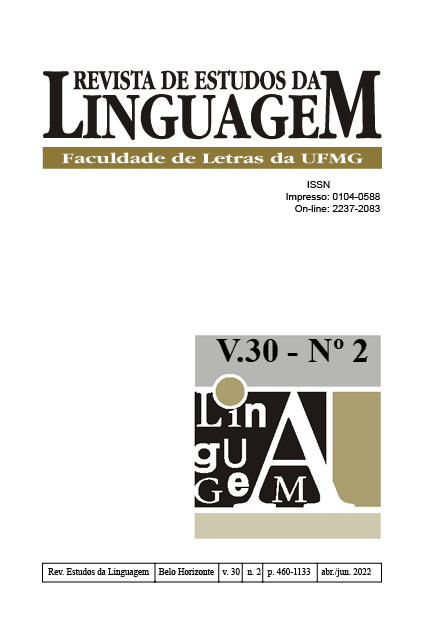Implicações da variação pronominal e das formas de tratamento na construção das personas de História da Minha Infância, de Gilberto Amado
DOI:
https://doi.org/10.17851/2237-2083.30.2.519-544Palavras-chave:
variação pronominal, perfis sociais, relações hierárquicasResumo
Neste artigo, busca-se apontar as implicações da variação pronominal e das formas de tratamento na construção das personas do texto literário memorialista, História da minha infância (1999), de Gilberto Amado. Assim, recorreu-se à noção de persona, trabalhada na Sociolinguística tanto por Eckert (2001, 2003, 2004, 2005), quanto por Coupland (2001), os quais defendem que o estilo, definido em termos de formalidade e informalidade, deve ser tomado para além de um contínuo, e ser observado enquanto um modus operandi diverso para a realização de uma mesma tarefa, e foi levada em consideração a teoria de Brown e Gilman (1960), conhecida como teoria do Poder e da Solidariedade. Segundo esses pensadores haveria dois princípios, o de poder e o de solidariedade, por meio dos quais se manifestariam as relações de forças existentes entre interlocutores. Este trabalho apoiou-se também na teoria da variação laboviana – a qual toma a variação como diretamente correlacionada a fatores sociais. Assim, toma-se o estilo como um fenômeno associado a outros fatores de natureza social, histórica, econômica, cultural, etc. Buscou-se demonstrar, portanto, como os perfis sociais de determinadas personagens são construídos tendo por base a vinculação de variantes linguísticas específicas, que, entre outras implicações, denotam as relações hierárquicas marcadas linguisticamente, entre elas destacam-se as simétricas (igualdade/afinidade) e assimétricas (inferioridade e superioridade) através do uso dos pronomes e formas pronominais você, tu, vosmecê, senhor, Vossa Senhoria, Coronel, e correlacionadas diretamente ao papel social desempenhado na sociedade ali retratada.





